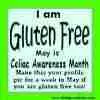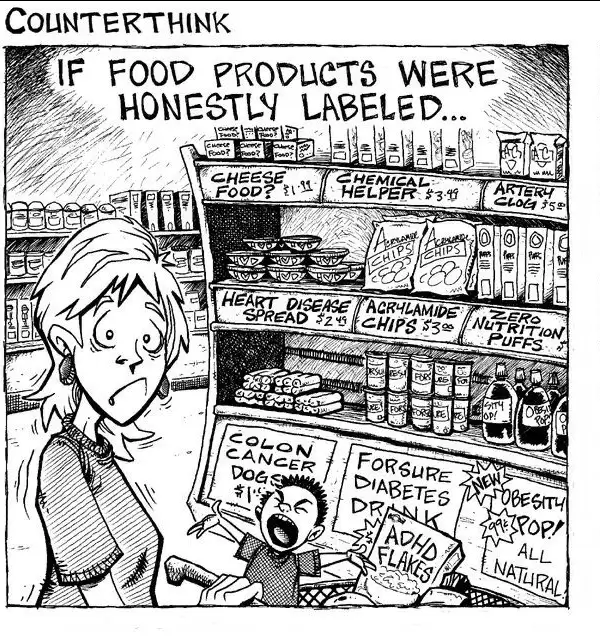-
Posts
6,047 -
Joined
-
Last visited
-
Days Won
112
Content Type
Profiles
Forums
Events
Blogs
Celiac.com - Celiac Disease & Gluten-Free Diet Support Since 1995
Posts posted by GFinDC
-
-
Sjogren's Disease is one of the conditions associated with celiac disease. you have a higher chance of having/getting one of the associated conditions than non-celiacs.
https://www.beyondceliac.org/celiac-disease/related-conditions/
There are some celiac people who get gluten ataxia symptoms instead of GI symptoms. The antibodies can attack nerves and brain cells.
-
15 hours ago, TinafromArkansas said:
Scott, I respectfully disagree based on months of research I have done in regards to the covid virus, and the vaccines themselves. Below you see statistical data from the CDC (one of many I have screenshot off of their page) that show a very high percentage rate. I'm not factoring anything in other than what the CDC is saying.
Thanks Tina! I assume you got this info from the VAERS system? I was looking at VAERS to try and find the overall vaccine caused death rate but couldn't figure out how to see that. Closest I got was I saw there were 1846 deaths from the vaccines but I am not sure that was a correct number. I've heard it is closer to 10K but wanted to verify that myself. The numbers are interesting but the percentage rate would be good to know too. 1846 deaths out of a 100 million vaccinations is not a huge percentage though. But I also am not sure that was the correct vaccination count for those 1846 deaths.
-
3 minutes ago, HopeMoore said:
I’ve had Celiac disease for over 5 years. I watch what I eat and all that. I did feel better at first but now I am tired ALL the time. I feel like I am dehydrated. I drink water all the time. Sometimes Gatoraide helps me feel better. Also in past few months constipation is awful. I have to take 2 weeks of laxatives to have a BM. It’s like my there’s no movement in my gut. Anyone else have problems like this? I have tried everything I know.
Might be a good idea to have your A1C tested for possible T-2 diabetes.
-
1 hour ago, Ted33 said:
I am waiting for my ebdoscopy biopsy results. One of the biopsys was to test for celiac. I had a blood test for celiac screening a few days ago and my test has come back as negative. Could i still have celiac disease? Im really confused as from my symptoms are really bad.. help!
Hi,
Yes, it is possible for the blood antibodies tests not to show positive but still have celiac disease. Some medications can cause this to happen.
-
-
Here's a search for doctors near Albany, NY that treat celiac disease. You want to see a GI (gastrointerologist), and hopefully one that deals with celiac disease.
Bleeding in the small intestine can be related to celiac disease damage. But it can be caused by other conditions also. A GI is specialist in digestive system conditions. There is a blood test called a celiac panel that tests for antibodies to gliaden, IgA, IgG etc. You need to be eating at least some gluten for 6 to 8 weeks before the blood tests every day. The endoscopy requires less time eating gluten.
-
Hi George,
Maybe a search on celiac group in your state will turn something up.
Your GI should have done a test for vitamin / mineral deficiencies? Depression/anxiety are linked to celiac and can be symptoms of deficiencies. Poor absorption of vitamins and minerals leads to many symptoms for people with celiac disease. B vitamins, D and some minerals like copper, zinc, magnesium, boron, may be low.
https://duckduckgo.com/?q=celiac+group+south+carolina&t=brave&ia=web
-
-
5 hours ago, CMCM said:
I got really sick the other night after having a fish oil capsule. I've had trouble with them before, and also after eating fish.....although not always after fish, so it's frustrating figuring out what is causing what. I definitely can't take a fish oil pill on an empty stomach. I hate having to mostly avoid fish and fish oil...don't see any other choice, though.
....
I don't know if this is the problem, but fish oil is an organic oil so it c an go bad/rancid if left sitting out at room temperature. It's better to keep fish oil capsules in the refrigerator or freezer even. Just a thot.
-
On 4/3/2021 at 5:09 PM, BrianG said:
Could you recommend a specific probiotic?
If I am taking a multi-vitamin that has B's in it, do I still need to take a B complex? I currently take B12.
Check out Jarrow Formula for one. They are a good brand name. Be sure to verify they are dairy-free tho. Many probiotics include some dairy. Solgar is a good brand and Naturemade too, but I haven't checked them for dairy. You can also find coconut yogurt in some grocery stores. "So Delicious" brand is one, but there others. Yogurts are made by bacterial action so are usually a good source of pro-biotics. Cheaper and tastier than pills too. Saurkraut is another natural probiotic.
-
Hi Bridget,
Since you have a high level of vitamin D I think you should correct that issue. Vitamin D is stored in fat so it doesn't wash out of the body like B vitamins do. Oily fish has vitamin D in it, so you may be getting all you need from the fish in your diet for now. I suggest you stop all vitamin D supplements now until your levels are back in a normal range. Myself I have the opposite problem and tend to being low on vitamin D.
Celiac disease impairs the absorption of nutrients and that can cause various symptoms and problems. Nerve problems are possible if B vitamins are too low. I have trouble swallowing probably due to B vitamin or D deficiency in the past.
https://www.verywellmind.com/symptoms-of-too-much-vitamin-d-5105134
https://www.livestrong.com/article/404634-b-vitamin-overdose-symptoms/
-
Hi Brian,
The first 6 months of the gluten-free diet can be a little rough IMHO. Recovery can seem sort of back and forth as far as symptoms go. I suppose your doctor knows what he means by mild celiac but it doesn't mean much to me. Your immune system either makes antibodies to gliaden or it doesn't. Mild symptoms is a different thing though.
Since you are having some symptoms a few over the counter meds might help. Pepto Bismol can help with gut irritation symptoms, peppermint Altoids or tea can help get gas out of the stomach. Reducing sugar, carbs and dairy can help reduce food for bacteria that produces gas and discomfort.
The surface area of the small intestine is about the same as a tennis court. So that's a lot of area to heal and a lot of territory for bacteria to colonize. The villi lining of the small intestine is what is destroyed by the immune attack. When it grows back we can absorb nutrients better. Probiotics may help some.
Betaine HCL may help your digestion also when taken with meals.
https://www.verywellhealth.com/marsh-stage-of-celiac-disease-562711
-
1 hour ago, BrianG said:
Okay, that makes sense. As someone who has mild symptoms, what happens if I eat gluten on vacation or at a special event or something like that? Can it be a once in a while type thing for someone with mild symptoms?
Hi Brian,
Symptoms don't directly equate to damage in the body. So mild symptoms can be from a lot of damage. People are different in their symptoms for celiac disease. But immune system damage will kill you eventually if you let it go on too long. Also, our guts tend to start reacting to more foods besides just wheat, rye and barley due to ongoing irritation. So you may lose the ability to eat a variety of other foods after a while. Read people's forum signatures to get some idea about that.
Short answer, no, cheating on the gluten-free diet is a no-no. the gluten-free diet is a medical diet, not a weight-loss diet.
I know the gluten-free diet can be tough at first, but after while our eating habits change and we adapt to it just fine.
It can take 18 months or more to heal the gut after going gluten-free.
-
Hi OT,
A decrease in antibodies is a good thing. It may take several months for them to get back to normal levels though. Your gluten-free diet is key to improvement and healing. i suggest you stick with meats, veggies, eggs, nuts and fruit for several months. Also avoid oats and dairy. Whole foods are safer than processed foods.
-
17 hours ago, BrianG said:
...
if I stop eating gluten, will my body respond more negatively to it when I do eat it? If that’s the case and my symptoms are manageable, does it stand to reason that I should just keep gluten as a small part of my diet?Hi BrianG,
No, you shouldn't keep eating a small amount of gluten. Celiac disease is an AI (auto-immune) condition. The immune system makes antibodies that attack the body cells, typically the gut lining first. The immune response kicks off when exposed to very low levels (microscopic) of gluten in the gut. And the immune response keeps going for weeks to months. So healing can't happen if you continue to eat even a tiny amount of gluten.
-
I think it's better to keep him 100% gluten-free for now. Eating a gluten-free diet is not harmful. There are plenty of naturally gluten-free foods to eat. He can get tested when he is older, like a young adult age. From his reaction to gluten I'd suspect celiac disease.
-
1 hour ago, jen99 said:
Thanks for so much detail here. I really appreciate it! Starting to put all the pieces together now!!

Hi Jen99,
If you do have celiac disease, then you need to avoid wheat, rye, barley and possibly oats. Also, dairy is often a problem for a couple months after starting the gluten-free diet.
If you do go dairy-free, it's important to take a calcium supplement like calcium citrate. Calcium citrate is more absorbable than calcium carbonate.
Other supplements you may want to take for a while are vitamin D, B-vitamins and boron, plus a mineral combo.
A good way to start the gluten-free diet is to eat whole foods like meats, veggies, eggs, nuts and fruit. Processed foods are best avoided at first. Also, low amounts of carbs and sugar can be hepful.
-
Liver problems can appear with celiac disease. Usually the cause is cell apoptosis (cell death) due to the immune attack on the small intestine lining. The dying cells let out a chemical scream that causes liver damage. Usually this damage is reversible on the gluten-free diet. Rarely someone will develop an auto-immune response to the liver itself. That condition is very rare though.
https://duckduckgo.com/?q=cell+apoptosis+celiac&t=brave&ia=web
Most likely if you show improvement in symptoms on the gluten-free diet you don't have auto-immune liver issues.
There 2 parts to the celiac disease diagnosis. Blood antibodies tests and then an endoscopy. You had the endoscopy but have you had the blood antibodies testing? It would be good to get that done if not. You want the full celiac disease antibody panel, not just the screening test.
Recovery from celiac damage depends on many things as far as time goes. Being 100% gluten-free is the most important thing. But you may need some supplements as well, like vitamin D, Betaine HCL, and B vitamins. Eating a diet of whole foods like meats, veggies, eggs, nuts and fruit it good. Avoiding processed foods, oats and dairy is helpful too. Betaine HCL and digestive enzymes can help your digestion and reduce digestive system stress. Peppermint tea can help relive stomach gas and Pepto Bismol can also relieve some symptoms.
Staying away from sugar and carbs can help with stomach gas also.
-
Hi Brian,
I am dairy free also. But, did you know that calcium is the largest mineral by % in the body? So it's important to take a calcium supplement if you are dairy free. Calcium citrate is a good form to take as it is more absorbable. Other important supplements to take are boron and vitamin D. They are both helpful in the chemical process of storing and retrieving calcium from bones. It is probably a good idea to take a multi-mineral supplement of some kind.
The best way to start the gluten-free diet IMHO is to stick with non-processed foods. Eat whole foods like meats, veggies, eggs, nuts and fruit.
You may still have enough antibodies to be detected in a blood test. If you did want to get one, ask for the full celiac panel, not just the screening test.
-
For those avoiding dairy the possibility of calcium deficiency exists. So it's helpful to find and take a calcium supplement. Calcium citrate is better for absorption than calcium carbonate. But the carbonate form is cheaper and more widely available.
https://labs.selfdecode.com/blog/calcium-deficiency/
-
-
Hi Linz,
Welcome to the forum!

You should be over the worst symptoms in a few months. But some symptoms may reoccur for years. It takes several months for the antibodies to subside.
Did you start eating gluten again to get tested? Being tested for celiac requires eating gluten for 6 weeks or so before he blood draw. Maybe you can get a doctor to do the celiac blood antibodies testing in the next few days?
Celiac disease is not an allergy so allergy testing doesn't show anything about it. Allergy testing is for IgE antibodies while celiac is IgA and IgG antibodies. IMHO you should fire the doctor who told you to eat gluten. Unless they were planning to test for antibodies that is.
-
-
9 hours ago, Melissa93 said:
Thanks! Yes that's a fair point. I have my vitamin D 5000UI from Jarrow Formulas, which make certified gluten free supplements. As far as I can see they seem good. I have to say that I stopped taking vitamin D supplements for about three months because of possible gluten being in my previous one. It took me a while to replace it, so in that meantime it will just go down including the winter time.
Your vitamin D deficiency did resolve it sounds like?
Yes, my D levels increased when I got a better quality supplement. I take a D pill most every day now. I was taking a RX D pill for months but it didn't help much.
https://labdoor.com/rankings/vitamin-d








Being asked to stop having celiac
in Parents, Friends and Loved Ones of Celiacs
Posted
There is a higher chance of her developing celiac disease since she is a first degree relative. It would be a good idea to have her tested for celiac disease. She may develop it at any time.